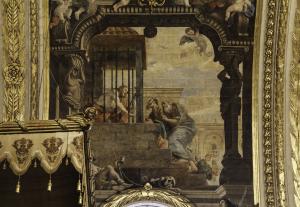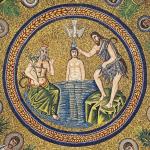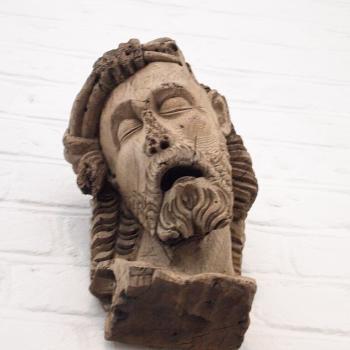
While, as the Gospel of John indicates, Jesus had performed miracles before his baptism, his public ministry began after John the Baptist’s work had come to its end. John knew he would have to decrease and finish his mission before Jesus would take up the mantle and present to the world what John said was coming, that is, the kingdom of God. Thanks to John, many knew something extraordinary was about to happen. John had told them if they wanted in on it, they needed to be prepared, which is why he could them to repentance. But the kingdom of God and its presence in the world would be something far different from what everyone expected. Even John did not know what it would be like. He only knew that the grace of God breaking into the world, overcoming the traditional distinction between the kingdom of God and the world at large. He sensed the immanent eschaton was at work. He knew it would be with Jesus, which is why he was surprised when Jesus came to him to be baptized, as he knew Jesus was the one to bring the kingdom and its graces to us.
Jesus was baptized and then went into the desert, where he fought against the temptations inherent in a bad understanding of the kingdom of God. There, he waited for a sign to indicate it was time to begin his public ministry:
Now when he heard that John had been arrested, he withdrew into Galilee; and leaving Nazareth he went and dwelt in Capernaum by the sea, in the territory of Zebulun and Naphtali, that what was spoken by the prophet Isaiah might be fulfilled: “The land of Zebulun and the land of Naphtali, toward the sea, across the Jordan, Galilee of the Gentiles — the people who sat in darkness have seen a great light, and for those who sat in the region and shadow of death light has dawned.” From that time Jesus began to preach, saying, “Repent, for the kingdom of heaven is at hand” (Matt. 4:12-17 RSV).
John had preached, “Repent, for the kingdom of heaven is at hand” and then Jesus, after John had been arrested, continued that message. John could only call forth repentance. Jesus, however, could and would bring much more. Jesus was the kingdom of God made present. The kingdom of God would transform the world from within. Thus, though Jesus and John used the same words, the meaning behind them changed. John was telling everyone that the kingdom was coming in the near future, while Jesus was making people aware of its presence in their midst.
Jesus gave to the world a baptism which transcended the baptism of John: John’s baptism was merely a baptism of metanoia, while Jesus brought forth the fiery grace of God. John represented the height of human preparation for the kingdom of God, while Jesus showed us how the kingdom of God could and would transcend the holiness found in such preparation. John knew and accepted this, though he also had questions, as can be seen in the way he, while in prison, had some of his disciples ask Jesus what was going on. Despite that, John never lost faith, and he accepted his role in salvation history, even in the way it would end
The kingdom of God is a kingdom of restorative grace, and Jesus, through the miracles associated with him, demonstrated this. The kingdom of God is not about some authoritarian control mechanism God established to keep people in check. It is about giving humanity true freedom. This is why, when Jesus revealed this, many religious authorities felt threatened and became antagonists towards him.
Those who accepted what Jesus offered changed their ways; they took the opportunity given to them and embraced it, receiving grace after grace. They were shown how the kingdom of God works: it embraces everyone by lifting them up, helping everyone transcend the limitations they have made for themselves. The more they cooperate with it, the more grace they receive, the more they will transcend themselves, and in such self-transcendence, share what they have given to others as they will not use their self as a barrier between themselves and those in need. For those who have been given grace are not to stand in the way of others receiving grace, but rather, to help everyone receive it and participate in the deifying grace of Christ together:
And his gifts were that some should be apostles, some prophets, some evangelists, some pastors and teachers, to equip the saints for the work of ministry, for building up the body of Christ, until we all attain to the unity of the faith and of the knowledge of the Son of God, to mature manhood, to the measure of the stature of the fulness of Christ (Eph. 4:11-13 RSV).
We are meant to build each other up. We are to come together as one, one body, the body of Christ, with each of us sharing the gifts we have been given to others so that in our mutual self-giving, we can all receive what we need. We must not push each other down; the more we do that, the more we find ourselves turning away from the kingdom of God and the grace which is being offered to all. That is, all those who embrace the unitive nature of the body of Christ will find the grace they gave been given provides them their proper place in that body, while those who try to divide up Christ from within will find they risk losing their place, as they deny their bonds with the rest of the body of Christ.
Those who selfishly turn away from the communion of love Christ wants them to have will find they will not able to attain their true potential. Everyone has their own gifts, their own place in the body of Christ, their own place in the kingdom of God. The better we realize this, the more we will welcome and help others attain their proper place alongside us. For, in truth, the fulness of Christ is not found in selfish individualism, with Christians looking at the world, and others in it, as someone to fight against and resist, that is, not in some sort of competition for survival. Rather, it is to be found in love. Christians are called to look around and try to bring everyone together as one, so that everyone then can share in the particular graces and gifts God gives to each person in their creation, leaving none of it out of their joyful communion of love.
Stay in touch! Like A Little Bit of Nothing on Facebook.
If you liked what you read, please consider sharing it with your friends and family!
N.B.: While I read comments to moderate them, I rarely respond to them. If I don’t respond to your comment directly, don’t assume I am unthankful for it. I appreciate it. But I want readers to feel free to ask questions, and hopefully, dialogue with each other. I have shared what I wanted to say, though some responses will get a brief reply by me, or, if I find it interesting and something I can engage fully, as the foundation for another post. I have had many posts inspired or improved upon thanks to my readers.













